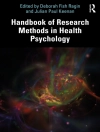The Lab Manual for Psychological Research, Fifth Edition, by Dawn M. Mc Bride and J. Cooper Cutting provides students with opportunities to practice and apply the knowledge and skills learned in their research methods course. Developed for use in a lab course or as take-home review, the manual contains four types of practice: exercises that connect to specific concepts, exercises for developing a research project, APA style exercises that become progressively more complex, and instruction for how to avoid plagiarism. The new edition provides fully revised exercises for the 7
th edition of the APA style guide along with other new and revised exercises. The book now follows the progression of steps in the research process to better to better match student projects. This comprehensive and practical manual can be used with Dawn M. Mc Bride′s best-selling
The Process of Research in Psychology, Fifth Edition, or as a supplement to other core texts.
Table des matières
PART I : Research Methods Exercises
1. Science Versus Pseudoscience Exercise
2. Science in the News
3. Reading Journal Articles Exercise—Shachnai et al. (2022)
4. Reading Journal Articles Exercise—Sana and Yan (2022)
5. Reading Journal Articles Exercise— Mojdehi et al. (2020)
6. Reading Journal Articles Exercise—Flanigan and Titsworth (2020)
7. Literature Reviews
8. Identifying and Developing Hypotheses About Variables
9. Bias and Control Exercise
10. Design a Study Exercise
11. Research Design Exercise
12. Design and Data Collection Exercise
13. Experiments Exercise
14. Identifying Independent and Dependent Variables Exercise
15. Operationally Defining Variables Exercise
16. Identifying Variables From Empirical Articles
17. Internal and External Validity Exercise
18. Ethics Exercise
19. Ethics in Published Study Exercise
20. Subject Sampling Exercise
21. Descriptive Statistics Exercise
22. Graphing Exercise
23. Misleading Graphs Exercise
24. Correlations and Scatterplots Exercise
25. Making Hypotheses Exercise
26. Inferential Statistics Exercise
27. Inferential Statistics and Analysis Exercise
28. Statistical Hypothesis Generation Exercise
29. Factorial Design Exercise
30. Factorial Design Exercise— Sproesser, Schupp, and Renner (2014)
31. Factorial Design Exercise— Farmer, Mc Kay, and Tsakiris (2014)
PART II : Research Project Exercises
32. Getting Your Research Ideas for the Group Project
33. Picking Your Research Idea for the Group Project
34. Brief Literature Review for Group Project Development
35. Group Project Literature Review
36. Variables in Your Group Projects
37. Mock Institutional Review Board Form
38. Pilot of Research Project
39. Statistical Analyses for Your Group Project
40. Group Project Data Analysis Exercise
41. Group Project Methods Section
42. Group Project Results Section
43. Group Project Discussion Section
44. Group Project Abstract
PART III : APA Style Exercises
45. Creating APA Style References
46. APA Style Exercise
47. Sample Manuscript Text
48. Citations and References
49. APA Exercise: Organizing and Formatting a Complete Report—Part A
50. APA Exercise: Organizing and Formatting a Complete Report—Part B
51. APA Exercise: Organizing and Formatting a Complete Report—Part C
52. APA Exercise: Organizing and Formatting a Complete Report—Part D
PART IV : Avoiding Plagiarism Exercises
53. Identifying Plagiarism
54. Avoiding Plagiarism
55. Summarizing, Paraphrasing, and Quoting Exercise
A propos de l’auteur
J. Cooper Cutting (Ph D, cognitive psychology, University of Illinois at Urbana-Champaign) is associate professor of psychology at Illinois State University. Dr. Cutting’s research interests are in psycholinguistics, primarily, with a focus on the production of language. A central theme of his research is how different types of information interact during language use. He has examined this issue in the context of lexical access, within-sentence agreement processes, figurative language production, and pragmatics. He has taught courses in research methods, statistics, cognitive psychology, computer applications in psychology, human memory, psycholinguistics, and sensation and perception. He is also a recipient of the Illinois State University SPA/Psi Chi Jim Johnson Award for commitment to undergraduate mentorship, involvement, and achievement. His non-academic interests include gardening and reading science fiction and fantasy novels.












